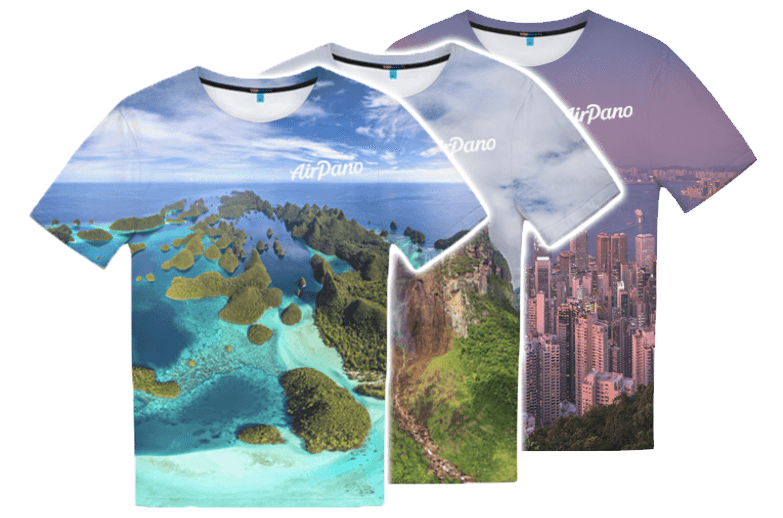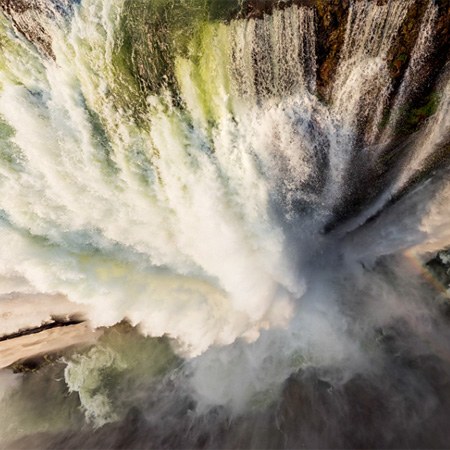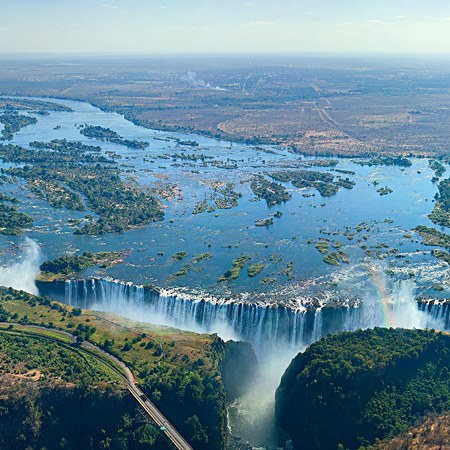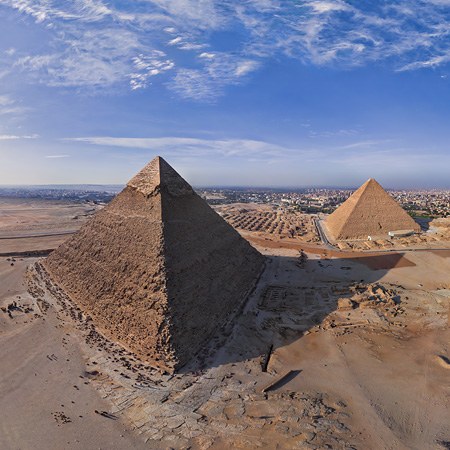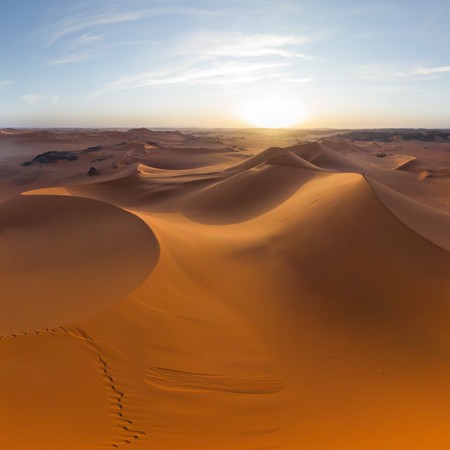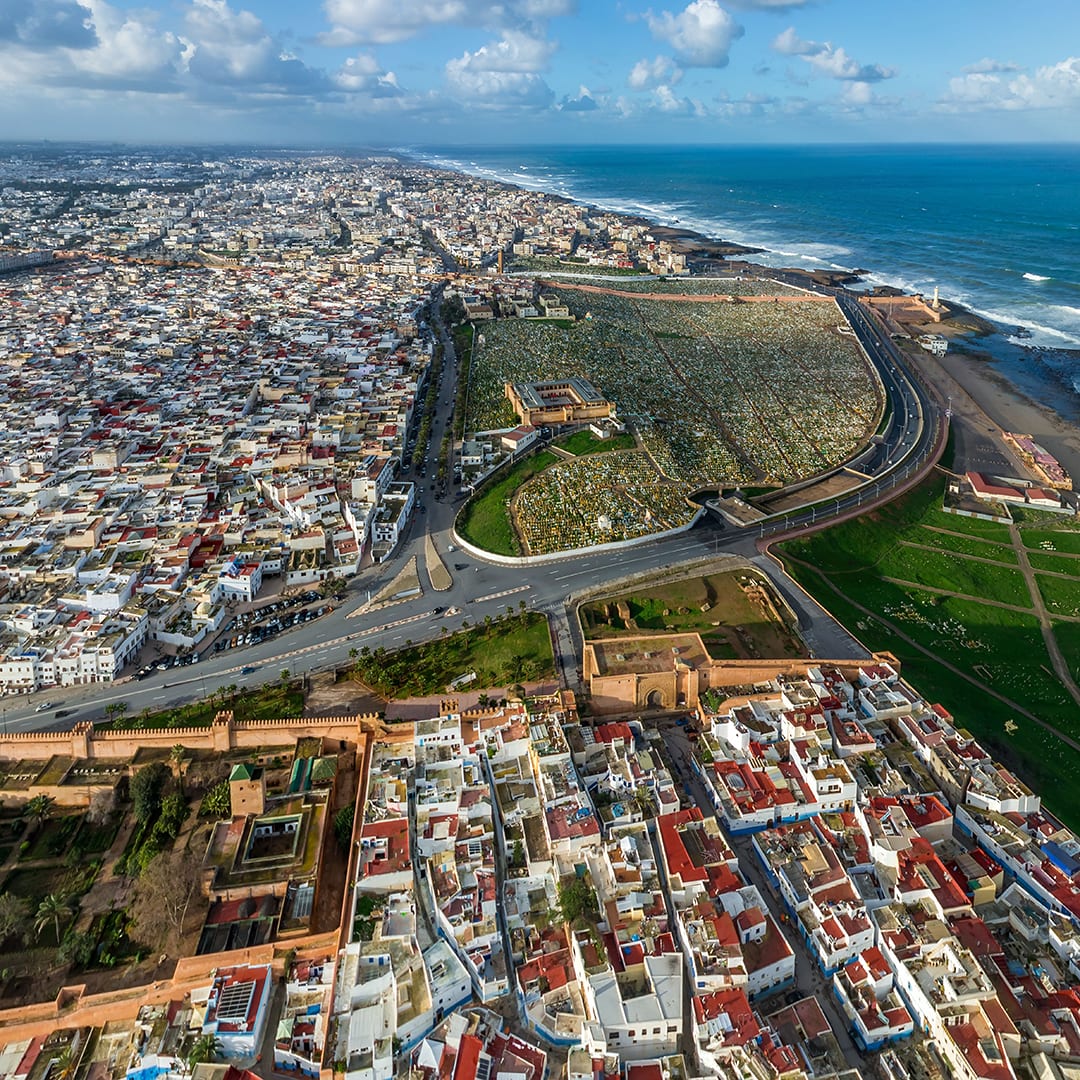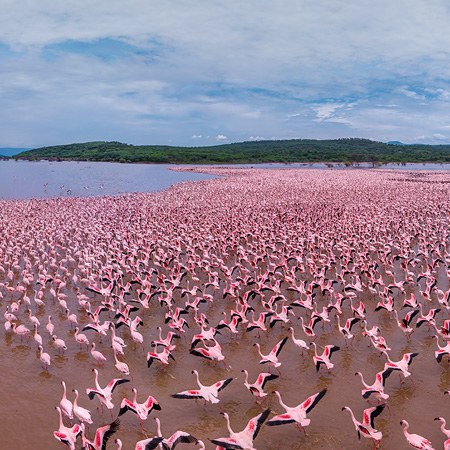Victoria Falls. The Biggest Waterfall of Africa
The Victoria Waterfall. First impressions
Our trip to the waterfall was not an easy one. We had to take several airplane routes, travelled through different time and climatic zones and, as a result, it took us more than 24 hours to get to Livingstone. As soon as we got to the hotel, we left our luggage there and immediately headed for the waterfall. The sun was already on its way to the horizon.
In October the water level in the Zambezi river is rather low, so the waterfall canyon was partly dry. But that was exactly what we needed: at this time of year one can walk on foot to the small island of Livingstone and get into the Devil's Pool. We were standing near the edge of the canyon while the sun illuminated the splashes of the main waterfall. Long ago when the discoverer David Livingstone first saw the waterfall from a distance, some say, he mistook it for a fire in savannah. The point is that when the water falls from the height of one hundred meters, it splits into thousands of drops that create giant clouds that can be seen from a distance of many kilometres. The locals call it ‘Mosi Oa Tunya' which means ‘Thundering smoke'.

Wildlife in the National Park
The next day we spent exploring the area and getting all the needful permissions for taking pictures in the National Park. At the same time we got acquainted with the inhabitants of the park. The mighty waters of Zambezi attract many animals. Here one can meet monkeys, hippopotami, elephants and giraffes. The elephants can easily walk in the river breaking trees on their way. Having witnessed that, I put off my plans to go to the park in the night: the thought of meeting an elephant on a small path in the middle of the night was not pleasant at all. And as for the giraffes, one day I managed to come quite close to them: in order to take some good photos of these animals, you have to be at a several meter distance. But despite the fact that the giraffes got used to the presence of people, still they were quite suspicious and were walking away from me on their long legs. Only several hours spent in the blaze of the sun brought me closer to success. Their curiosity got stronger and they came closer to have a look at that noisy man with a camera. My patience was rewarded by several good pictures that I managed to make.

Monkeys are worth special mentioning. They are creatures that are not afraid of anyone. Monkeys attack suddenly, they pull your backpack and the strap of your camera, show their teeth. If they notice food on you, you can say it goodbye. Actually, a group of monkeys in your way is quite dangerous. They look nice and lovely only in cartoons. In real life it is better to stay away from them. Monkeys were not allowed to appear on the territory of our hotel. But I witnessed how one rather impudent baboon managed to climb over the fence, steal the breakfast of two scared women and run away being accompanied with laughter of two security guards.
Livingstone Island and the Devil's Fall
Destinations that interested us more than others were Livingstone Island and the Devil's Pool. The island is situated in the middle of the river and usually is surrounded by water. During a dry season the water level decreases, and you can walk on foot to the island. However, this island is a private territory, so the number of people permitted to visit it is limited and they have to be accompanied by the guide. The demand for the visits is high, so we managed to reach the island only on the next day.

The most interesting thing that attracts the visitors here is the Devil's Pool. Near the very edge of the waterfall there is a small deepening with a weak water flow. You can look over the edge and see how the huge amount of water falls into nowhere. It looks absolutely amazing! In order to get to the pool you have to swim across a small channel, walk on a stone ridge and then slide down into the pool. At first we were going to take pictures using a long pole with a camera attached to it. I even managed to swim with all this equipment right to the pool, but we found out that this approach was not good enough. Anyway, our best pictures were taken with the help of our drone.
During the rainy season around 500 000 tons of water run through the waterfall every minute. At the time of our arrival that amount was much less, but still it looked very impressive. The falling water was making such a noise that you could hardly talk while standing near it.
Our first shooting day resulted in a failure. Our camera rig broke down and the ‘result' of the whole working day along with all our equipment fell into the river. We were trying to catch it and even offered a reward for anyone who would find it. But all that was in vain: only the giggling of hippopotami spread over Zambezi. We did not succeed in rescuing our cameras.

Rafting
The Zambezi is famous not only for the Victoria Falls, but also for its rapids: rafting and kayak amateurs from all over the world come here. We decided to look at the rapids and for that matter we needed a raft. To be honest, I thought that it would be an easy trip, but it turned out to be much more serious.
Having received our life vests, helmets and paddles, we headed down towards the river where we found some more adventure loving folk. We boarded a yellow raft and set out sailing. Our captain immediately warned me that I should not even attempt to use my camera until we reach the seventh rapid because all the members of the team should be paddling. Thus I realised that my hope for an easy trip had disappeared.

There were 19 rapids and more than 30 kilometres of white water waiting for us. Our co-sailors were Peter and Rita — an elderly couple full of adventure spirit. As it later turned out, they had set out for a five-day trip down the river and were in a very assertive mood.
We took the paddles and set sailing. Here was the first rapid! Splashes, a quick fall of the raft somewhere downwards, sweeps of paddles — and here we were, passed the first riffle! Well, quite funny, but wet.
I will not weary you with the descriptions of all the rapids, I will just tell the names of some of them: The Boiling Pot, Stairway to Heaven (the 5-grade rapid, the highest class permitted for commercial rafting), The Devil's Toilet Bowl, Commercial Suicide (the rapid grading 6 — the highest class in rafting; we had to pass it by land), The Gnashing Jaws Of Death, The Washing Machine, Double Trouble and Oblivion (one of the hardest in the river). Actually, a harsh name was not always an indicator of difficulty of the rapid: in the middle of our adventure I even managed to take out my camera and take some pictures.

Meanwhile we were getting closer to Oblivion. Our captain tied all our belongings to the boat with two ropes, and our voyage seemed to be getting serious. The turnover probability in this rapid was 60%. But there's no turning back!
Oblivion was not that big, but looked very impressive. We were intensively working the paddles, the raft whirled in the stream, huge splashes of water everywhere. And then suddenly I found myself flying over the raft, then under it. "Well, now I am overboard". Somewhere near Rita was swimming as well. Having noticed that somehow my oar paddle was not lost, I threw it back into the boat.
Actually, we've managed not that bad, despite the fact that all the left side of the raft was swept away. Nevertheless, all the equipment was safe, and we managed to take some good photos as well.
The Canyon
Having passed all these rapid on the river, we decided to take some photos of them from the canyon using our drone. But the way to the canyon of Zambezi was not that easy.
In the morning our guide Brent gave us a ride to the edge of the canyon and introduced two other guys, who knew the way and would help in carrying our heavy equipment. The way itself was a narrow lane which fishermen used from time to time, though it seemed that they did not use it at all.
The guys went ahead quite cheerfully, Stas was trying to keep up with them with a drone on his shoulder, and in the very end was me, dragging myself behind them all. It was getting more and more hot every now and then the dry narrow lane was treacherously crumbling. Soon I lost sight of my companions. Dense bushes which grew along the lane had a lot of spikes that scratched my clothes; my shoes were full of sand and stones. Out of my breath, I went out to the river where I found my friends. They looked not much better than me, but seemed to be more cheerful. I thought that our journey was over, but it turned out that we had to climb big stones and crags along the river. I should have given up in the very beginning?

But fortunately, it turned out that climbing over stones was easier than walking on a crumbling lane. Soon we got to the rapid and started waiting for someone to drift down the river. Navigation did not work in a proper way, so Stas had to control the drone manually and I was correcting the flight and watching the indicators on the devices. We saw a couple of boats turning over — that rapid was truly difficult. But all the teams had passed it successfully.
The noon was approaching, the black cliffs grew burning hot — there was no escape from the sun. We almost ran out of drinking water (keep in mind that we still had a trip back to the hotel ahead of us).
And this trip back of ours turned out to be even more difficult. We could not touch the rocks, the shoe soles started melting. The only way to survive was to keep on walking. Finally we came to the lane and started walking upwards. Fifty steps. Stop. Breathe. One hundred steps — a sip of water. Fifty more steps...

When the spiky bushes that bothered me on my way down appeared, I was almost happy — at least some shadow. The guys were breathing heavily. No wonder — they had some additional weight, while I was carrying only a small backpack. Slowly we were walking upwards.
After a while that seemed to be an eternity, we encountered Brent who greeted us with a box of cool water. It had never tasted so delicious.
Crossing the border
The day was rather eventful. Having ‘recovered' after our visit to the canyon, we quickly took our luggage and rushed to the border. In Zambia there was a helicopter waiting for us, but we did not have much time. Quickly we passed the border and caught a taxi-driver who agreed to give us a ride only to the Zambian border, but no further — he was working only between the frontiers.
While we were busy with our luggage, tricky monkeys spotted some sandwiches in my bag and attempted to take them. But no such luck for them: I fought off my food and, being cursed by them, I managed to retreat comfortably. It was very nice of the pilots to send a car for us, and soon we were riding on a bumpy road.

The Helicopter
The helipad was on a hill near a huge baobab, which was quite noticeable from a distance. Our pilot Mike waiting for us in the helicopter.
We took all the necessary equipment and got into the helicopter. I took the back seat, Stas took the front one. During the flight the back door remained open so that we would be able to take photos. At first it was quite frightening to fly with an open door, but the sight of all these marvellous lands compensated the fear. Having made a couple of test-flights over the canyon, we landed in the savannah to mantle our equipment on the outside of the chopper. With the noise of the helicopter's rotor we dived into the canyon flying quite close to the river, banking and then gaining altitude towards the setting sun. In such a way we made some more flyovers at different altitudes. Mike skilfully operated the helicopter: in the open door we could see the sky, then the river, the wall of the canyon, then the sky again. A couple of sharp turns and we found ourselves flying over the savannah again, heading for the main waterfall. The splashes of water reflected colours of the setting sun. The waterfall didn't look that frightening from above, but still remained pretty mighty. Here Mike made two more flyovers and then we were on our way back to the familiar baobab. The time flowed fast during the flight. The sun was almost behind the hills.
Epilogue
Our two weeks in Africa are finally over. It's time to go home. It will take us four flights and almost 48 hours to get home. But there is some special material with us — unique videos of the Victoria Waterfall. It means that all was not in vain.
Click here to see 360° photopanoramas of Victoria Falls.
Authors of the video, photos and text: Sergey Shandin, Stas Sedov Stitching by Ivan Roslyakov and Nickolay Denisov
27 January 2021
Read more
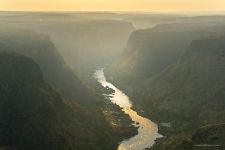 Victoria Falls #22
Victoria Falls #22
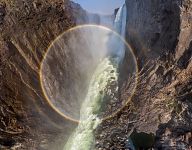 Rainbow in waterfall splashes #2
Rainbow in waterfall splashes #2
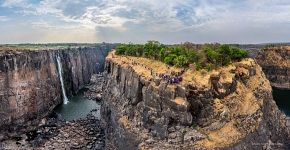 Knife Edge Point #2
Knife Edge Point #2
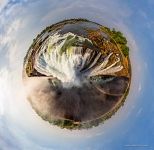 Victoria Falls. Planet #5
Victoria Falls. Planet #5
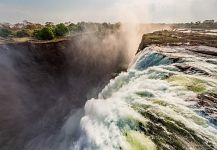 Devil's Pool #3
Devil's Pool #3
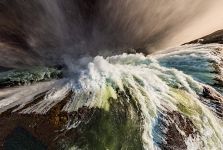 Devil's Pool #7
Devil's Pool #7
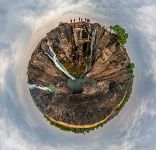 Angels Armchair Falls. Planet
Angels Armchair Falls. Planet
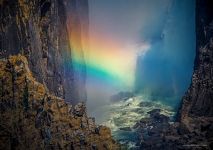 Victoria Falls #21
Victoria Falls #21
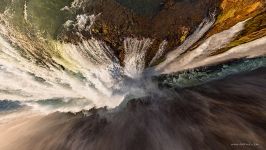 Devil's Pool #11
Devil's Pool #11
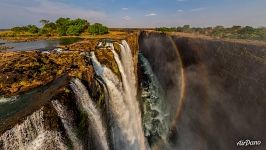 Victoria Falls #26
Victoria Falls #26
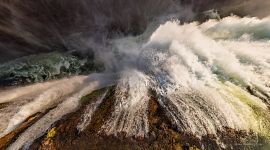 Devil's Pool #12
Devil's Pool #12
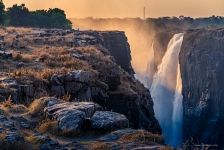 Victoria Falls #20
Victoria Falls #20
Virtual Travels in 360°
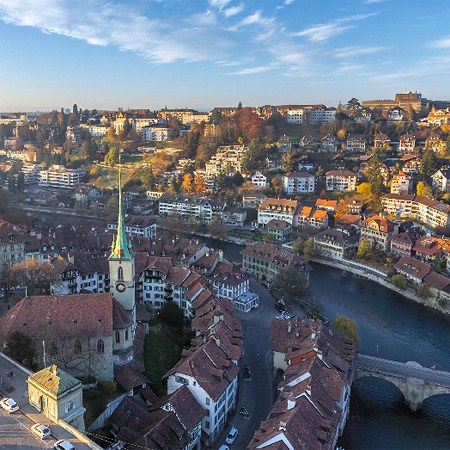 Bern, Switzerland
Bern, Switzerland
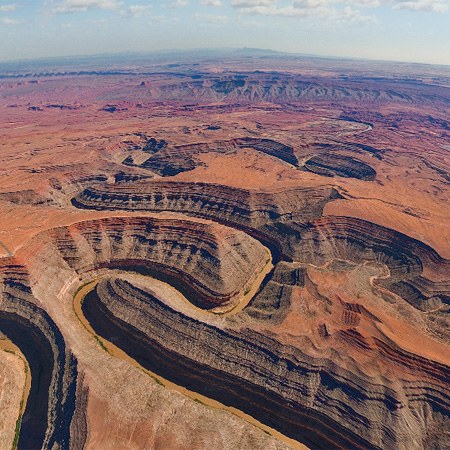 San Juan River, Goose necks, Utah, USA
San Juan River, Goose necks, Utah, USA
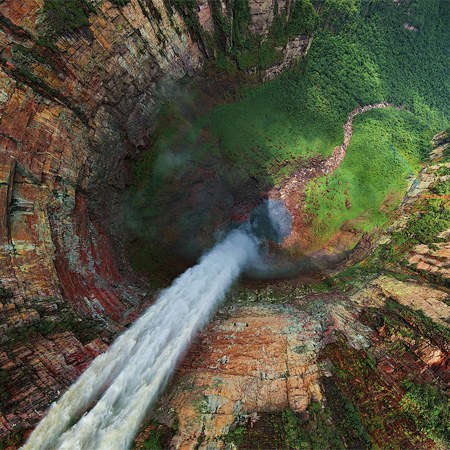 Dragon and Cortina falls, Venezuela
Dragon and Cortina falls, Venezuela
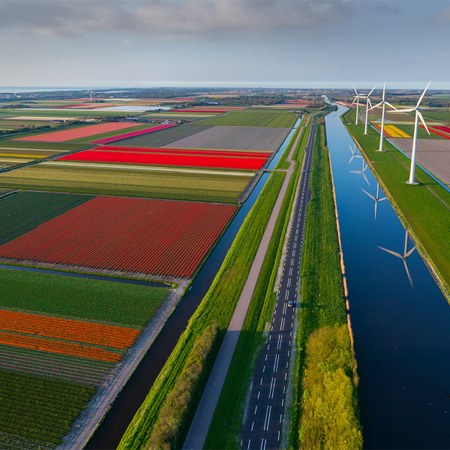 Holland. The country of tulips
Holland. The country of tulips
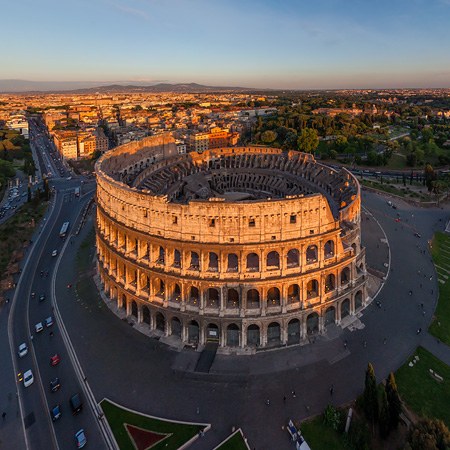 Roman Colosseum, Italy
Roman Colosseum, Italy
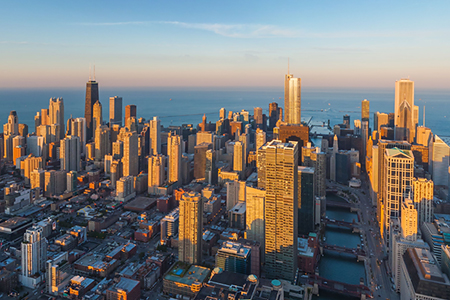 Relax flight over Chicago, USA
Relax flight over Chicago, USA
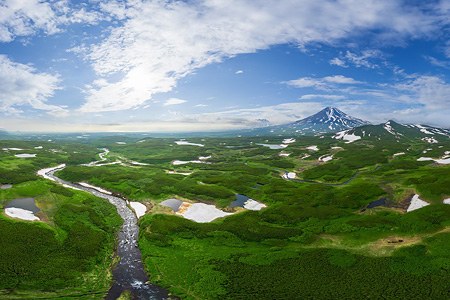 Kambalnaya River. Part I
Kambalnaya River. Part I
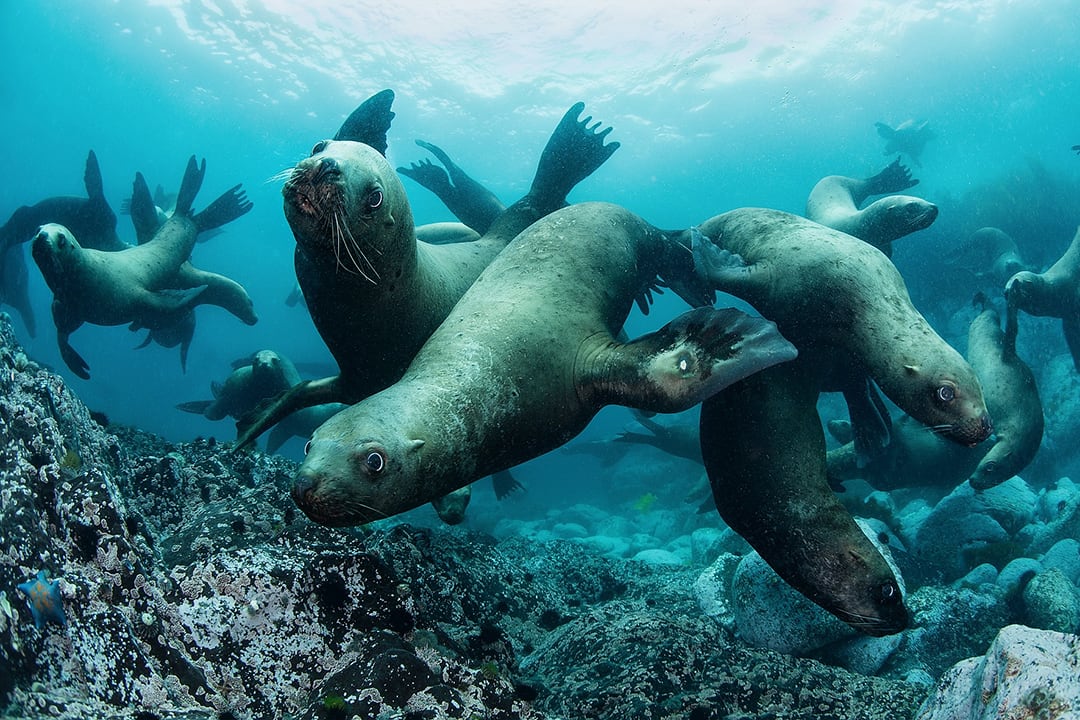 Underwater. Seals and Sea Lions
Underwater. Seals and Sea Lions
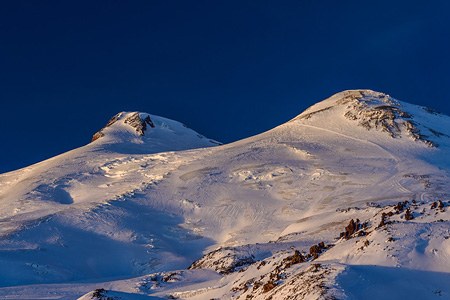 Mount Elbrus, Russia. Part II
Mount Elbrus, Russia. Part II
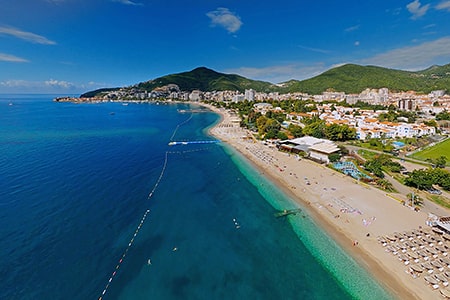 Beaches of Montenegro
Beaches of Montenegro
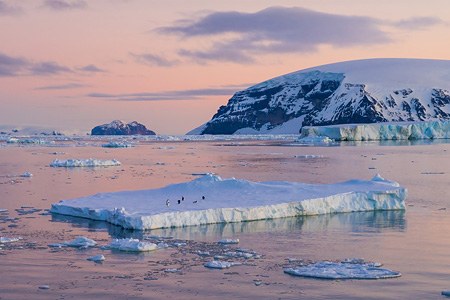 Antarctica, Part II
Antarctica, Part II
Show more

